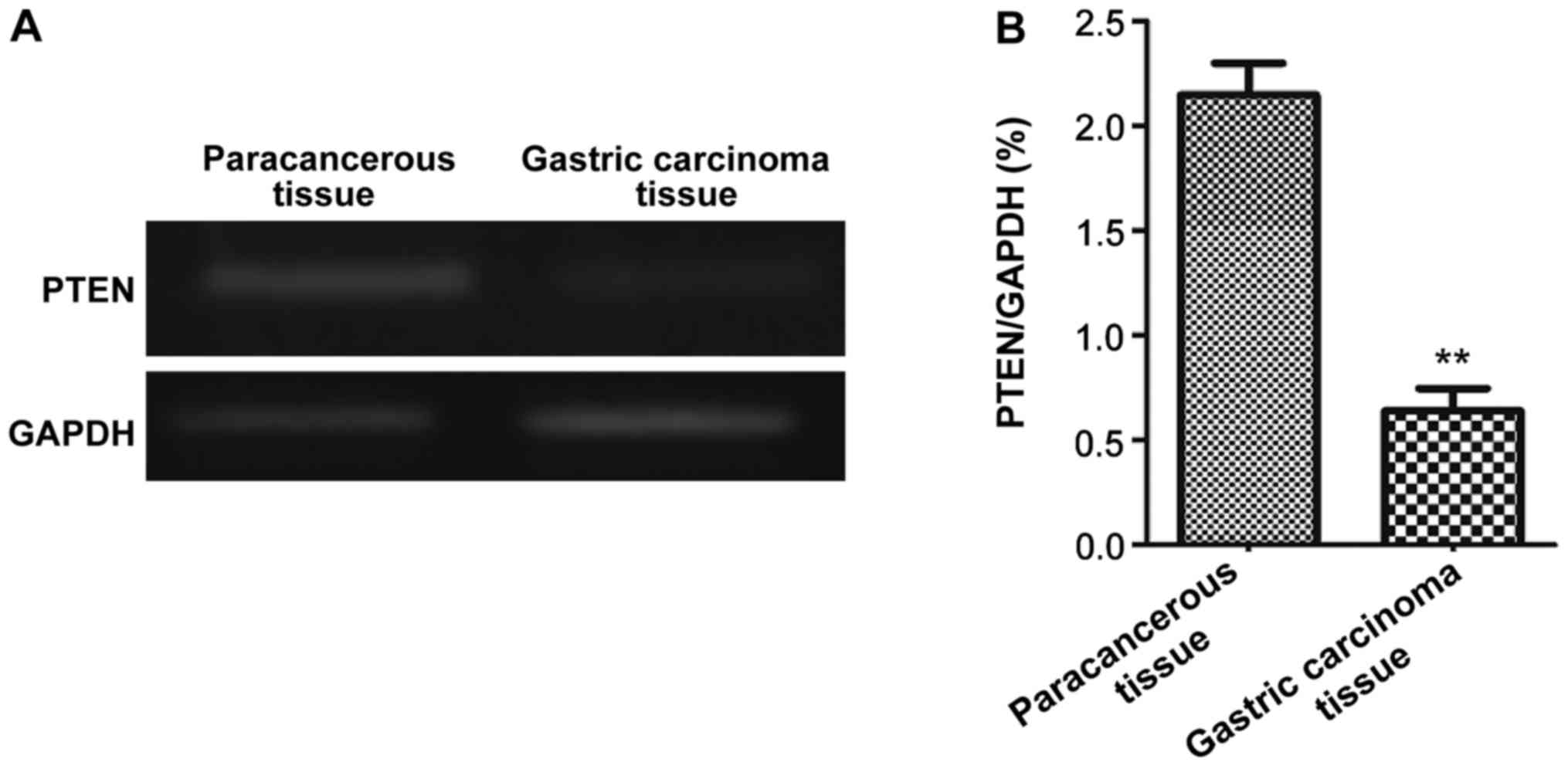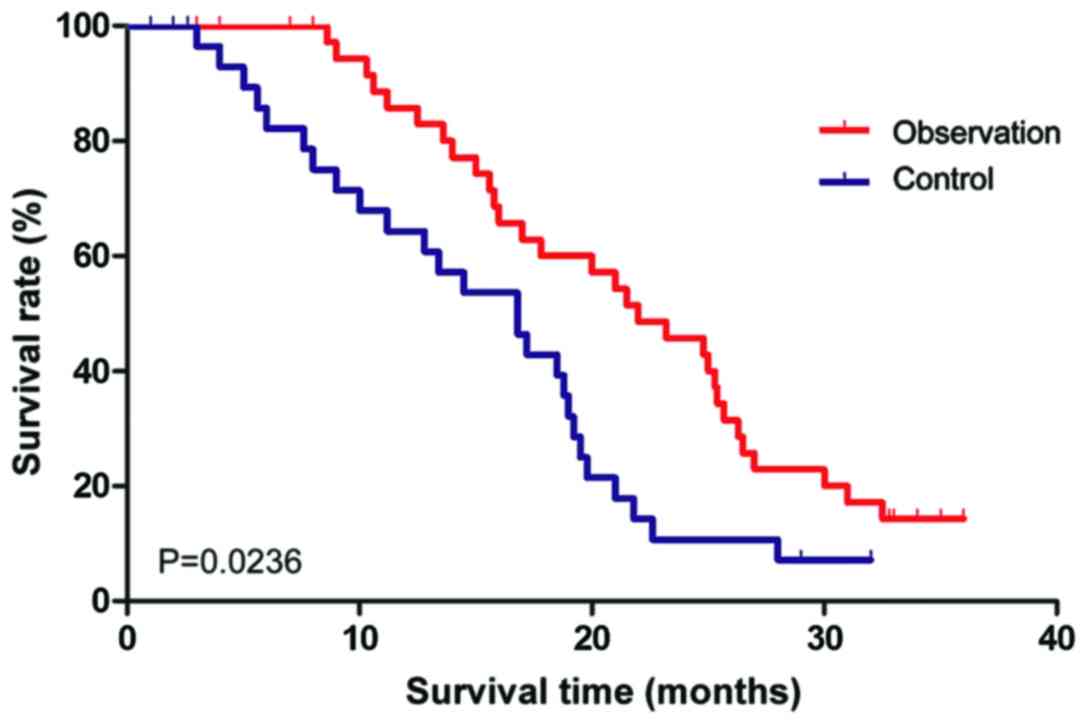|
1
|
Higashi T, Nakamura F, Shimada Y, Shinkai
T, Muranaka T, Kamiike W, Mekata E, Kondo K, Wada Y, Sakai H, et
al: Quality of gastric cancer care in designated cancer care
hospitals in Japan. Int J Qual Health Care. 25:418–428. 2013.
View Article : Google Scholar : PubMed/NCBI
|
|
2
|
Rostom A, Ross ED, Dubé C, Rutter MD, Lee
T, Valori R, Bridges RJ, Pontifex D, Webbink V, Rees C, et al:
Development and validation of a nurse-assessed patient comfort
score for colonoscopy. Gastrointest Endosc. 77:255–261. 2013.
View Article : Google Scholar : PubMed/NCBI
|
|
3
|
Zhang BG, Li JF, Yu BQ, Zhu ZG, Liu BY and
Yan M: microRNA-21 promotes tumor proliferation and invasion in
gastric cancer by targeting PTEN. Oncol Rep. 27:1019–1026.
2012.PubMed/NCBI
|
|
4
|
Yang TS, Yang XH, Wang XD, Wang YL, Zhou B
and Song ZS: MiR-214 regulate gastric cancer cell proliferation,
migration and invasion by targeting PTEN. Cancer Cell Int.
13:682013. View Article : Google Scholar : PubMed/NCBI
|
|
5
|
Conde-Perez A and Larue L: PTEN and
melanomagenesis. Future Oncol. 8:1109–1120. 2012. View Article : Google Scholar : PubMed/NCBI
|
|
6
|
Bian EB, Li J and Zhao B: miR-29, a
potential therapeutic target for liver fibrosis. Gene. 544:259–260.
2014. View Article : Google Scholar : PubMed/NCBI
|
|
7
|
Jin Y, Qiu MZ, Wang DS, Zhang DS, Ren C,
Bai L, Luo HY, Wang ZQ, Wang FH, Li YH, et al: Adjuvant
chemotherapy for elderly patients with gastric cancer after D2
gastrectomy. PLoS One. 8:e531492013. View Article : Google Scholar : PubMed/NCBI
|
|
8
|
Wang SI, Puc J, Li J, Bruce JN, Cairns P,
Sidransky D and Parsons R: Somatic mutations of PTEN in
glioblastoma multiforme. Cancer Res. 57:4183–4186. 1997.PubMed/NCBI
|
|
9
|
Brakebusch C and Fässler R: The
integrin-actin connection, an eternal love affair. EMBO J.
22:2324–2333. 2003. View Article : Google Scholar : PubMed/NCBI
|
|
10
|
Osaki M, Oshimura M and Ito H: PI3K-Akt
pathway: Its functions and alterations in human cancer. Apoptosis.
9:667–676. 2004. View Article : Google Scholar : PubMed/NCBI
|
|
11
|
Yilmaz S, Zergeroglu AD, Yilmaz E,
Sofuoglu K, Delikara N and Kutlu P: Effects of sperm DNA
fragmentation on semen parameters and ICSI outcome determined by an
improved SCD test, halosperm. Int J Fertil Steril. 4:73–78.
2010.
|
|
12
|
Cong M, Liu T, Wang P, Fan X, Yang A, Bai
Y, Peng Z, Wu P, Tong X, Chen J, et al: Antifibrotic effects of a
recombinant adeno-associated virus carrying small interfering RNA
targeting TIMP-1 in rat liver fibrosis. Am J Pathol. 182:1607–1616.
2013. View Article : Google Scholar : PubMed/NCBI
|
|
13
|
Adhikari N, Mondal D, Jana M, Kumari K,
Das KJ and Julka PK: Primary neuroendocrine tumor of seminal
vesicle: An extremely rare clinical entity emphasizing diagnostic
role of 68-Ga DOTANOC PET-CT scan and therapeutic potential of long
acting depot octreotide injection in maintenance. Clin Genitourin
Cancer. 14:e539–e543. 2016. View Article : Google Scholar : PubMed/NCBI
|
|
14
|
Sajant J, Heikkinen E and Majamaa K: Rapid
induction of meningeal collagen synthesis in the cerebral cisternal
and ventricular compartments after subarachnoid hemorrhage. Acta
Neurochir (Wien). 143:821–826. 2001. View Article : Google Scholar : PubMed/NCBI
|
|
15
|
Thompson ME, Harver A and Eure M: A model
for integrating strategic planning and competence-based curriculum
design in establishing a public health programme: The UNC Charlotte
experience. Hum Resour Health. 7:712009. View Article : Google Scholar : PubMed/NCBI
|
|
16
|
Tanaka M, Lee J, Ikai H and Imanaka Y:
Development of efficiency indicators of operating room management
for multi-institutional comparisons. J Eval Clin Pract. 19:335–341.
2013. View Article : Google Scholar : PubMed/NCBI
|
|
17
|
Shaffer FA and Tuttas CA: Nursing
leaderships responsibility for patient quality, safety, and
satisfaction: Current review and analysis. Nurse Lead. 3:34–43.
2009. View Article : Google Scholar
|
|
18
|
Jansen PL, Klinge U, Jansen M and Junge K:
Risk factors for early recurrence after inguinal hernia repair. BMC
Surg. 9:182009. View Article : Google Scholar : PubMed/NCBI
|
|
19
|
Kayaoglu HA, Hazinedaroglu SM, Erkek A
Bulent, Kocaturk PA, Kavas GO and Aribal D: Comparison of the
plasma and hernia sac tissue copper levels in direct and indirect
inguinal hernia patients. Biol Trace Elem Res. 108:53–59. 2005.
View Article : Google Scholar : PubMed/NCBI
|
|
20
|
Shoulders MD and Raines RT: Collagen
structure and stability. Annu Rev Biochem. 78:929–958. 2009.
View Article : Google Scholar : PubMed/NCBI
|
|
21
|
Friedman DM, Sokal SM, Chang Y and Berger
DL: Increasing operating room efficiency through parallel
processing. Ann Surg. 243:10–14. 2006. View Article : Google Scholar : PubMed/NCBI
|
|
22
|
Dexter F: Impact on operating room
efficiency of reducing turnover times and anesthesia-controlled
times. Ann Surg. 245:336–337. 2007. View Article : Google Scholar : PubMed/NCBI
|
|
23
|
Kurz A: Thermal care in the perioperative
period. Best Pract Res Clin Anaesthesiol. 22:39–62. 2008.
View Article : Google Scholar : PubMed/NCBI
|
|
24
|
Cook PR and Cullen JA: Caring as an
imperative for nursing education. Nurs Educ Perspect. 24:192–197.
2003.PubMed/NCBI
|
















